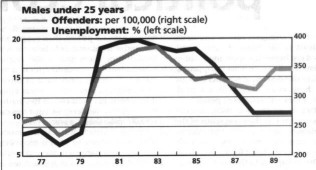Publications Index | Encyclopedia of Trotskyism | Marxists’s Internet Archive
Socialist Review Index (1993–1996) | Socialist Review 175 Contents
Socialist Review, May 1994
Briefing
Prisons
The longest sentence
From Socialist Review, No. 175, May 1994.
Copyright © Socialist Review.
Copied with thanks from the Socialist Review Archive.
Marked up by Einde O’Callaghan for ETOL.

|
|
Males under 25: Offenders & Unemployment
|
|
- In April 49,000 people were in prison in Britain and the
number is rising by 200 a week. The figure is up 8,000 since Michael
Howard claimed last year that ‘prison works’ by taking offenders
off the street.
- If prisons cut offending, the US should be crime free. Its
prison population is up from 300,000 in 1980 to 1,400,000 today. The
length of sentences has almost doubled. But the crime rate rose
steadily from 1985.
- In Britain reported crime has risen 250 percent under the
Tories. This is despite the biggest prison building programme in
over 100 years, and despite average prison sentences lengthening 50
percent in the 1980s.
- The Home Office estimates a 1 percent cut in the crime rate
would require a 38 percent increase in the prison population –
locking up another 20,000 people. A Home Office handbook of 1986
states, ‘No increase in prison terms would make a substantial
impact on crime rates.’
- The Tories ignore this. They aim to send more people to
jail, especially the young – even locking up ten-year-olds. They
want longer sentences, a cut in the numbers allowed bail and jail
terms for ‘persistent minor offenders’.
- Who goes to jail is a question of class. One in four
prisoners have been in care. Almost half are under 21. City
businessman Roger Leavitt swindled millions and got community care.
Probation officers report young offenders jailed are ‘invariably
poor, often destitute, barely able to subsist’.
- Prison sentences are racist: 17.5 percent of inmates are
black or Asian, more than four times the rate in the general
population. Other figures suggest black people are seven times more
likely to go to prison than whites.
- Jails are grossly overcrowded. Rat and cockroach
infestation is routine. But Howard says ending slopping out ‘is no
longer a priority’, nor is cutting the number of prisoners kept
three to a cell. Prison governors complain of ‘having to use force
to send prisoners hundreds of miles from their homes’.
- Howard announced harsher prison conditions – a ‘more
austere regime’ at last year’s Tory conference. Visits, access
to television and time out of cells will become privileges, ‘earned’
by good behaviour.
- Bad conditions do not cut reconviction rates. In 1980 the
Tories promised to ‘wipe the smile off the faces of young thugs’
at new prison camps that would deliver a ‘short sharp shock’.
The Home Office later reported ‘no effect on the rate at which
trainees were reconvicted’
- Harsh regimes do cause suicides and self injury. There have
been 228 suicides in the past five years – almost one a week –
and around 3,000 cases a year of serious ‘self harm’. Home
office figures show ‘poor’ or ‘spartan’ regimes have the
highest rates.
- The government plans a new generation of privately run
‘borstals’ or ‘approved schools’ called Juvenile Training
Centres. They will be modelled on Lisnevin, a private jail for 12-
to 15-year-olds in Northern Ireland. A study showed 89 percent of
its inmates reoffend. More than a third are ‘severely disturbed’.
- Many of the old borstals were privately run. In 1967 an
inquiry into the suicide of a 15 year old at the country’s biggest
approved school uncovered routine violence by staff. It was closed.
The prison service is run by a former Granada TV executive and
member of the right wing Adam Smith Institute, Derek Lewis. His
‘corporate plan’ anticipates a jail population of 55,000 to
60,000 by 1999, yet aims to cut costs by 5 percent.
- It costs between £23,000 and £30,000 a year to keep
someone in prison – more than a university education. (The current
maximum government grant to students is £2,200 a year.) If
prisoners are allowed to ‘work’ – one in two inmates are not –
they get an average £6 a week.
- One in ten adult jails are to be private by 1996. ‘There’s
millions to be made in British prisons’, says the boss of a US
prison firm. Annual profits are projected at £100 million.
- John Major has attacked ‘airy fairy theories’ for
dealing with crime, and employment secretary David Hunt blames
thieving on ‘wickedness and greed’. But crime is linked to the
economy – 70 percent of convicted offenders last year were
unemployed. Home Office figures show burglary rates match
joblessness among young men.
- Stopping offenders returning to prison depends on giving
them jobs. A leaked Home Office document admits, ‘The single most
effective form of intervention is the provision of employment.’
Yet less than one in eight offenders on probation is in full time
work – 64 percent have been unemployed for more than a year.
- The Prison Officers Association voted in April to ‘take
action to regain full trade union rights’. Howard banned
industrial action in prisons last November. When prison officers
worked to rule for three months in 1980 they refused to take more
inmates than prisons were certified to hold and the prison
population fell by over 4,000.
- Labour’s Tony Blair got in ahead of the Tories to demand
‘custodial sentences’ for children after the killing of toddler
James Bulger last year. Labour MPs responded to the early release of
500 prisoners in Scotland – to relieve overcrowding – by
complaining it would promote ‘a crime spree’.
Top of page
Socialist Review Index | ETOL Main Page
Last updated: 18 April 2017
